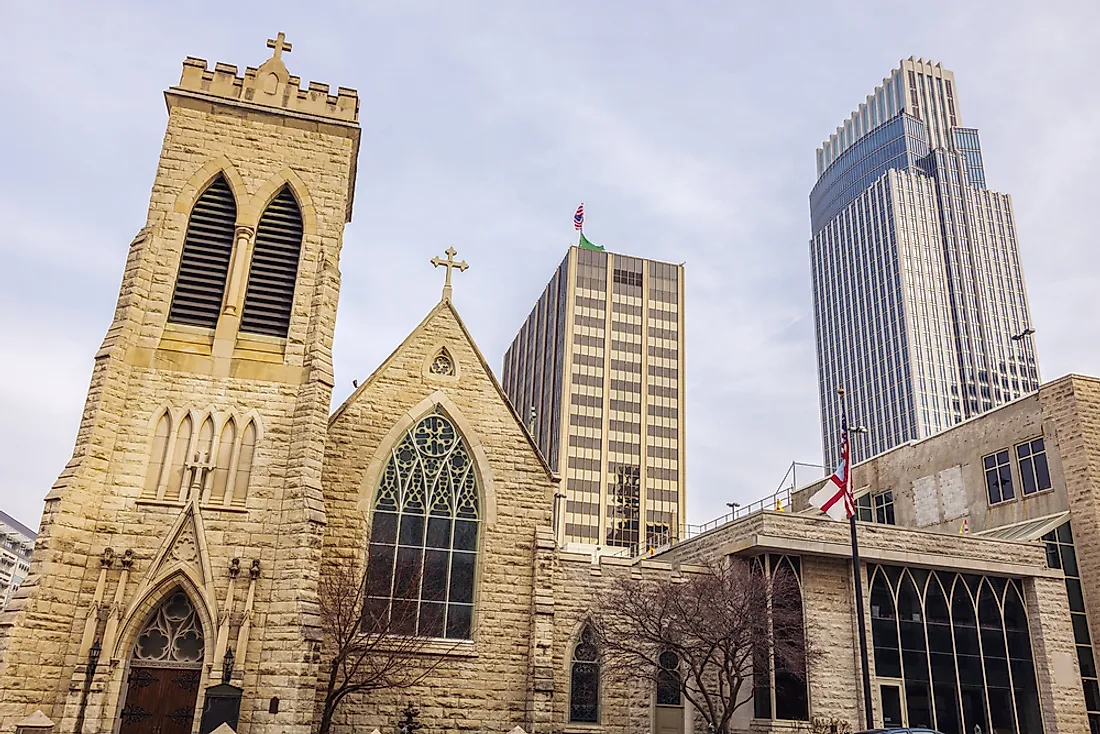Major Religions of Nebraska

Religion can be described as a set of beliefs on a supernatural being and cultural practices shared by human beings. It includes transcendental beliefs that have been passed on from the believers to the converts that the followers held as actively meaningful and they are founded on documented doctrines, as in a case of an organized religion or they could be based on established cultural practices as in a case of folk religion. Religion may include some aspects such as texts, worldviews, ethics, prophecies, and behaviors. The word religion may have been coined from the Latin word religo which translates to good faith or ritual.
There are about 10,000 religions in the world but the primary five include Christianity, Islam, Hinduism, folk religion, and Buddhism. Folk religion is based on cultural practices while the other four are based on established doctrines. A poll done in 57 countries in 2015 indicated that 63% of the world’s population was religious, 22% were not religious, and 11% were atheists. According to Pew Research Center, approximately 70.6% of adults in the US identified themselves as Christians in 2014. According to Gallup Poll, 2016, Mississippi was the most religious state in the US and New Hampshire was the least religious state. Nebraska is a triple landlocked state in the US, and the state's population was estimated at 1.907 million in 2016. Lincoln is the capital of the state while Omaha is the largest city.
Religious Demographics In Nebraska
Christians make up for a majority of the adult population in Nebraska. About 75% of the adults in Nebraska identify as Christians. 25% of these adults are evangelical Protestants. There are several denominations under the evangelical Protestants. The denominations include Baptist Family which account for 4%, the nondenominational family makes up 4%, Lutheran Family makes up 7%, Presbyterian 1%, Pentecostal family 4%, restorationist family 2%, holiness family, Congregationalist family, reformed family, and Adventist family make up for less than 1% each. Some of the evangelical Protestant churches include the Southern Baptist convention, Free Will Baptist, nondenominational charismatic, Assemblies of God, Community Church, Lutheran Church Missouri-synod, Church of God (Cleveland, Tennessee). There are also the Pentecostal Church of God, Community Church, Church of the Nazarene, Pentecostal Holiness Church, Wesleyan Church, Churches of Christ, and Calvary Chapel.
Mainstream Protestants
Mainstream Protestants account for 24% of the total Christian population. Denominations under Protestants include Baptist family 2%, Methodist family 8%, non-denominational family 2%, Lutheran family 8%, Presbyterian family 3%, Episcopalian/Anglican family 1%, restorationist family, Congregationalist family, and reformed family account for less than 1% of the total mainline Protestants. Some of the mainland protestant churches include; American Baptist Churches USA, Evangelical Lutheran Church in America, United Methodist Church, Episcopal Church, Anglican Church, Disciple of Christ, United Church of Christ, Reformed Church in America, Anabaptist Family and Friends Family.
Non-Christian Faiths
The non-Christian faiths account for 4% of the total adult population in Nebraska. The Non-Christian faiths include the Buddhists, Hindus, while other faiths make up 1% each, Jewish, Muslim and other world religions account for less than 1% each. The other faiths include Unitarian, deist, humanist, eclectic, spiritual but not religious, pagan/Wiccan, new age, and Native American religions. Buddhism is a religion based on the teachings and philosophies of the Buddha. The Jewish religion, also known as Judaism, is a religion based on the culture and teachings of the Jewish people. Hinduism is an Indian way of life, and it is said to be the oldest religion in the world. The major Native American religions included Earth Lodge Religion, Indian shaker religion, ghost dances, longhouse religion, mexicyotl, Native American church, and waashat religion. Deists practice deism, and it is a religion whereby the followers link the existence of nature to prove that there is God, they do not believe in miracles.
Unaffiliated
The unaffiliated, also known as religious nones make up 20% of the population of the state. The unaffiliated include atheists 1%, agnostic 4%, and those who subscribe to nothing in particular, making up 15%. Atheists do not believe in any divine or sacred supernatural being while agnostics are of the belief that the existence of God is not known. Agnosticism is usually referred to a set of beliefs and not a religion.
Don’t Know
There are also a group of people who are undecided on what religion they follow and they make up 1% of the population of Nebraska. These people are not sure whether they subscribe to any religious beliefs or not.
Religious Beliefs
According to research carried out on a sample population in 2014, about 66% of the adult population in Nebraska was sure they believe in God while 9% did not believe in God. 54% found religion to be important in their lives, and 39% attended religious service at least once a week. 52% of the population prayed daily, 21% weekly and 18% rarely prayed or did not pray at all. 34% of the select population said they look to religion for guidance on right and wrong, 10% said they look to philosophy or reason and the highest number, 46%, said they use common sense. A more substantial percentage, 52%, rarely read scriptures with 30% reported reading scriptures at least once a week.
What Is The Religious Composition Of The Adult Population Of Nebraska?
| Religion | % of adherents in total population |
|---|---|
| Christian | 75% |
| Non Christian Faiths | 4% |
| Unaffiliated | 20% |
| Don’t Know | 1% |











